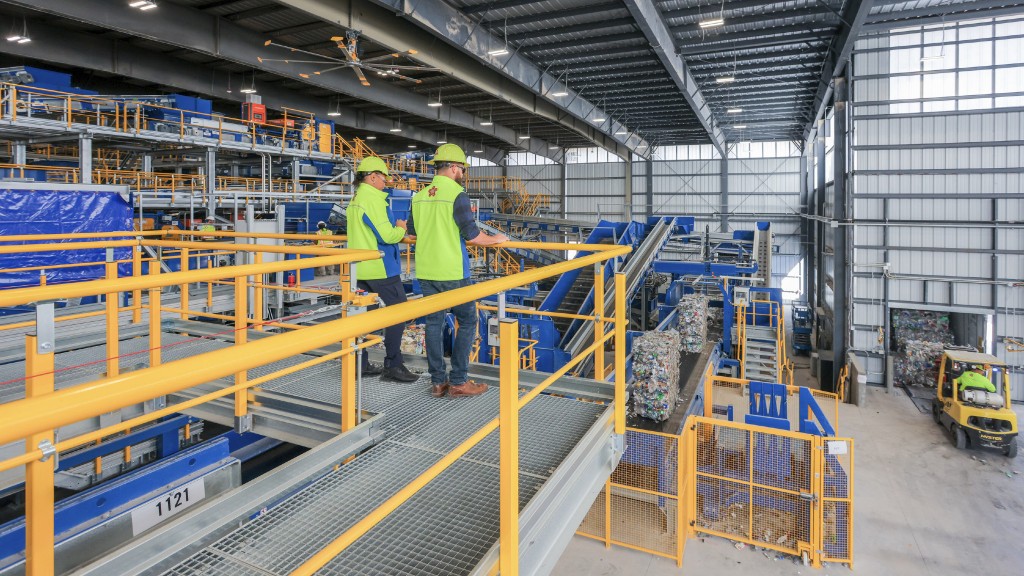Creating an acceptance for recycled materials
An interview with Stefan Kaiser, Manager of Vecoplan AG's Recycling Division

Mr. Kaiser, what is the importance of the recycling economy for Vecoplan?
Stefan Kaiser: The recycling economy is one of the greatest challenges of the future. It will help to improve the overall image of the plastics industry - from the producer and processor to the recycler. We must learn to appreciate that we need to deal with plastics more sustainably. The recycling economy is important for Vecoplan, as a major part of our business lies in recycling and waste handling. We have been trying for a long time to put valuable raw materials back into circulation.
The recycling quota for glass, metals and waste paper is more than 90%. For plastics, it is much less. Why is it comparatively difficult to recycle plastics?
Stefan Kaiser: We have a broad mix of plastics which are put into circulation. These are often materials which are not made from a monopolymer but from several plastics - for example multi-layer films. At the same time, different plastics are mixed in one product. The more compounds one creates, the more difficult it is to separate these from one another. Recycling is then correspondingly laborious and expensive. It is therefore so important to think about the recycling capability right at the product design stage. One possibility, for example, would be to produce a film from only one plastic and, in return, to make it somewhat thicker.
But wouldn't this possibly make the film more expensive?
Stefan Kaiser: We must consider the costs over the whole life-cycle of a product. Recycling costs are part of such a consideration. It then very soon becomes clear that even if a company produces highly economically, it is only efficient if recycling is not too laborious. Those who market plastic products should think about how sustainably their products can be used.
Are political measures necessary to achieve such a change in thinking?
Stefan Kaiser: We should not be too hasty to involve the legislator. But in the past, it has been shown that, as a whole, legislation, regulation and standards can move an industry forward. As we have a problem with recycling, this requires specifications from the politicians with regard to recyclable product design. From my point of view, this is urgently required to avoid the acceptance of plastics being lost. We should emphasise the advantages of this material more strongly. Also to show where it is used and what benefits it brings. We must demonstrate what is possible with recycling and how recycled materials can be used.
Do technologies already exist then for recycling plastics in high quality?
Stefan Kaiser: The quality of recycled materials has improved considerably in recent years. Today, as a result of processing techniques, we are able to recycle plastics with high purity. I think the main problem lies in creating acceptance by the consumer. Processors should be aware of one thing: as well as the primary material, there is often the more favourable option of using recycled plastic. Of course, these granulates must comply with the necessary standards. It is important to show how it can work. We are also talking to injection moulder manufacturers. They can tell us what the processed material must be like to enable it to be injection-moulded and to be worked equally well. Many companies still believe that secondary plastics are difficult to handle and jeopardise reliable production.
How great is the potential for recyclable plastics?
Stefan Kaiser: Recycled material is not the same quality as new plastic. We are all agreed on that. It is therefore necessary to analyse the applications specifically. For each product, the processor should ask whether new material is necessary or whether recycled material is sufficient. There are companies which act in this way, but there are still too few. What is necessary is acceptance by the consumer, by the processors - and their customers. Only if they accept these recycled plastics will this drive the manufacturers to produce higher quality products from recycled materials. The quantities will then be sufficiently large to make it worthwhile. Therefore, the greater the acceptance, the lower the price.
Can bio plastics improve the image?
Stefan Kaiser: Bio plastics can be divided into bio-based and biologically degradable plastics. In the case of degradable plastics, I think their use is critical; in the case of bio-based plastics, I can definitely see a possibility. Particularly when fossil materials have been used up and sustainable raw materials increase in importance.
Can you explain that in more detail, and what is the difference?
Stefan Kaiser: Bio-based plastics are produced organically, for example from corn starch. The end product has the same properties as a product made from refined oil - and requires a similarly long time to decompose. In recycling, the material is treated in exactly the same way as any other plastic. On the other hand, degradable plastics only have the basic form and behave like a plastic. To process them so that they can be recycled is more difficult. But in return, they can rot. Not as quickly as a banana, but still faster than a normal plastic bag, which needs approximately 450 years to do so. When composting, higher temperatures and moisture can accelerate the decomposition process. In spite of this, consumers should not fooled into thinking that bio plastics are the answer.
Company info
5708 Uwharrie Road
Archdale, NC
US, 27263
Website:
vecoplanllc.com
Phone number:
336-861-6070



